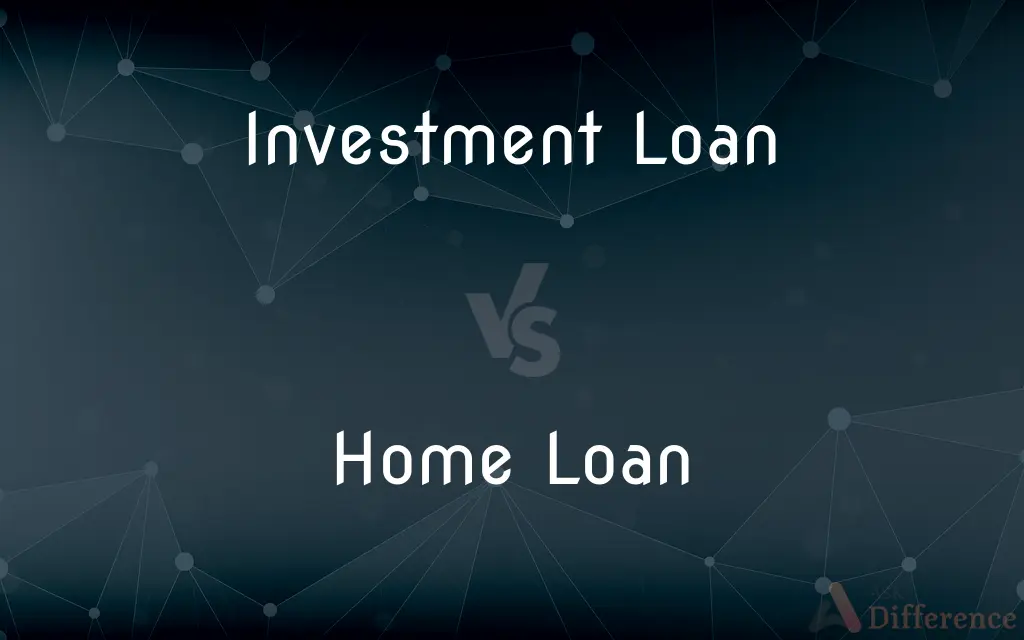Investment Loan vs. Home Loan — What's the Difference?
By Maham Liaqat & Urooj Arif — Published on March 2, 2024
Investment loans are designed for purchasing assets to generate income or profit, often with higher interest rates due to greater risk. Home loans, are specifically for buying or refinancing a primary residence, usually featuring lower interest rates.

Difference Between Investment Loan and Home Loan
Table of Contents
ADVERTISEMENT
Key Differences
Investment loans cater to those looking to invest in properties or assets that will generate income or appreciate in value over time. These loans are considered riskier by lenders, often resulting in higher interest rates and stricter qualification criteria compared to home loans.
Home loans, on the other hand, are provided to individuals looking to buy or refinance their primary residence. The purpose is not income generation but providing a place to live, which carries different financial and emotional implications.
One key difference lies in the tax treatment of interest and expenses related to the loan. Investment loan interest and related expenses may be tax-deductible if they are incurred in the pursuit of income generation. However, for home loans, the tax deductibility of interest and expenses is typically limited and subject to various regulations and limits, reflecting the personal use nature of the property.
The down payment requirements can also vary significantly between the two. Investment loans usually require a larger down payment due to the higher risk associated with investment properties. In contrast, home loans might offer lower down payment options, supported by government programs aimed at encouraging homeownership.
Lenders may impose stricter lending criteria for investment loans, including higher credit score requirements, a stronger financial standing, and proof of potential rental income. This is due to the perceived higher risk of default on investment properties, as investors may prioritize their primary residence's mortgage in financial distress.
ADVERTISEMENT
The interest rates for investment loans are typically higher than those for home loans. This reflects the lender's assessment of the increased risk of lending for investment purposes. Borrowers should consider this cost difference when planning their investments and financing.
Comparison Chart
Purpose
To purchase assets for income or profit generation
To buy or refinance a primary residence
Interest Rate
Generally higher due to increased risk
Lower, reflecting lower risk
Tax Implications
Interest and expenses may be tax-deductible
Limited deductibility for interest and expenses
Down Payment
Typically higher
Can be lower, with various government programs
Lending Criteria
Stricter, reflecting higher risk
More lenient, aimed at encouraging homeownership
Compare with Definitions
Investment Loan
A loan for purchasing assets expected to generate income/profit.
She took out an investment loan to buy a rental property.
Home Loan
A loan for buying or refinancing a primary residence.
They secured a home loan to purchase their first house.
Investment Loan
May require a larger down payment.
A 30% down payment was needed for his investment loan.
Home Loan
Features lower interest rates compared to investment loans.
Their home loan had a favorable interest rate.
Investment Loan
Interest and related expenses could be tax-deductible.
The investor deducted her investment loan interest from her taxes.
Home Loan
Aimed at encouraging homeownership.
The home loan program made their dream of owning a home possible.
Investment Loan
Often has higher interest rates due to risk.
The investment loan's rate was higher, reflecting its riskier nature.
Home Loan
Down payment can be lower, with support from government programs.
Just 5% down was required for their home loan.
Investment Loan
Stricter qualification criteria apply.
He needed a higher credit score for the investment loan approval.
Home Loan
Limited tax deductibility on interest and expenses.
They could only deduct part of their home loan interest on taxes.
Common Curiosities
What makes home loans different from investment loans in terms of down payment?
Home loans often have lower down payment requirements, supported by government homeownership programs.
Why are investment loan interest rates higher?
Due to the higher risk associated with financing investment properties.
Are the qualification criteria different for investment loans?
Yes, investment loans typically have stricter criteria due to the higher risk of lending for investment purposes.
What's the primary purpose of an investment loan?
To finance the purchase of assets intended for income generation or profit.
Can I deduct the interest paid on a home loan from my taxes?
Yes, but the deductibility is limited and subject to various regulations.
Why might an investor choose an investment loan despite higher costs?
For the potential income or appreciation in value that exceeds the cost of borrowing.
Can investment loan interest and expenses be tax-deductible?
Yes, if they are incurred in the pursuit of generating income from the investment.
Is it easier to qualify for a home loan?
Generally, yes, due to lower risk and various programs aimed at promoting homeownership.
Can I use a home loan to buy an investment property?
No, home loans are intended for primary residences, not for investment purposes.
How do lenders view home loans in comparison to investment loans?
As less risky, due to their use for primary residences, resulting in more favorable terms.
What's a key factor lenders consider when approving an investment loan?
The potential income generation of the property and the borrower's financial stability.
What happens if I default on an investment loan?
Similar to a home loan, defaulting can lead to foreclosure, but the financial implications may vary based on the property's use and income generation.
How do down payment requirements affect the choice between an investment loan and a home loan?
Higher down payments for investment loans may deter some investors, while lower down payments for home loans facilitate homeownership.
Are there programs to assist first-time investors like there are for first-time homebuyers?
While less common, some programs may offer support for first-time investors, though they're generally not as robust as those for homebuyers.
What tax benefits are associated with home loans?
Limited tax deductibility of interest and certain expenses, aimed at homeowners.
Share Your Discovery

Previous Comparison
Black Widow vs. Red Back Spider
Next Comparison
White Sapphire vs. DiamondAuthor Spotlight
Written by
Maham LiaqatCo-written by
Urooj ArifUrooj is a skilled content writer at Ask Difference, known for her exceptional ability to simplify complex topics into engaging and informative content. With a passion for research and a flair for clear, concise writing, she consistently delivers articles that resonate with our diverse audience.












































